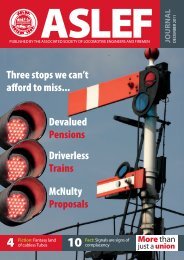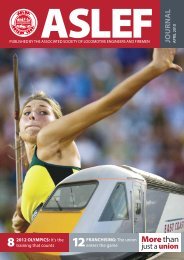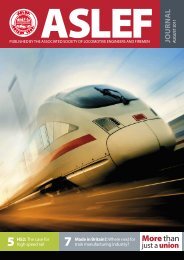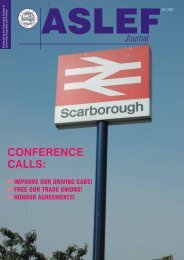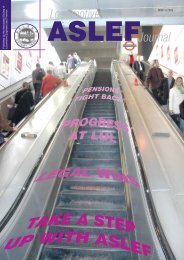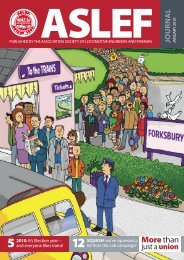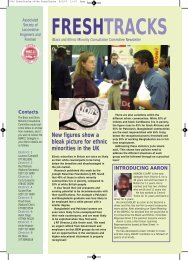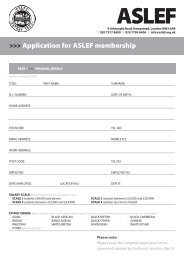You also want an ePaper? Increase the reach of your titles
YUMPU automatically turns print PDFs into web optimized ePapers that Google loves.
8 Training The ASLEF JOURNAL<br />
Germans show the way<br />
on driver training<br />
ASLEF Education Project Worker Chris Nutty recently<br />
visited Germany to look at driver training in that<br />
country. This is a summary of his report …<br />
I<br />
T IS not an accident that Germany<br />
has risen to become a world leader in<br />
manufacturing and finance following<br />
the devastation of the Second World War. It<br />
has been achieved by training people to a<br />
high standard - and implementing a high<br />
standard of basic education.<br />
The first surprise of my visit was when I<br />
went to a very ordinary looking college in the<br />
suburbs of Frankfurt. It had 2,000 apprentices<br />
studying the normal subject you would expect<br />
- car mechanics, carpentry, robotics - and train<br />
driving! The three-year train driving course<br />
includes other rail industry subjects like train<br />
conductors’ duties and ticket sales. As with all<br />
German apprenticeships it also includes<br />
modules on politics, religion and ethics.<br />
The college employs two trainers for the<br />
train driver apprenticeships. One of the three<br />
designated rooms contains a large model<br />
railway which is used to demonstrate the<br />
principles of rail operations. As with any<br />
apprenticeship, the trainee drivers divide their<br />
time between the college and, mostly, gaining<br />
hands-on experience. The apprenticeship is<br />
one way of becoming a driver in Germany -<br />
another method exists for older candidates.<br />
STATE OF DB ART<br />
I also visited the state-of-the-art Deutsche<br />
Bahn (DB) Driver Training Centre at Fulda.<br />
Centre manager Reymund Weitzel showed me<br />
around the facility which contains no less than<br />
five high spec train simulators. Three are<br />
regional trains and the other two are ICE trains<br />
- Germany’s 300 kph flagship.<br />
I was invited to undertake a training session<br />
ICE train at Frankfurt station<br />
Harold Schmid, Transnet, Silke Tegenkamp,<br />
DB's Training department and Chris Nutty<br />
at the Darmstadt training centre<br />
in one of the very realistic top-of-the-range ICE<br />
simulators which gives excellent feedback on<br />
under braking and acceleration. It was the first<br />
time I had used a simulator in my 30 years of<br />
driving trains, and I was impressed. It was a<br />
fantastic aid to driver training.<br />
I also met a group of mature trainee drivers<br />
who, I learned, must have completed a year’s<br />
training in mechanics or electronics before DB<br />
will take them on as drivers.<br />
I think the German’s train driver’s<br />
apprenticeship is an excellent route for young<br />
people to enter the industry and gain a<br />
nationally recognised qualification at a high<br />
level. The only nationally recognised<br />
qualification for train driving in the UK is to<br />
take an NVQ at level 2. While this is a good<br />
qualification that I’d recommend, I believe the<br />
German apprenticeship at level 3 is more<br />
appropriate for our grade.<br />
It was a worthwhile study visit that will give<br />
the ASLEF Education Project the opportunity<br />
to look at the German model of delivery and<br />
see where it fits alongside the UK system.<br />
Chris’ study visit was sponsored by a Clive<br />
Jenkins European Study Bursary. This is run by<br />
the TUC for union members to visit Europe to<br />
study and report on an aspect of trade<br />
unionism, industrial relations, training or<br />
employment education.<br />
The bursaries cover travel and subsistence<br />
only. They do not cover loss of earnings. For<br />
more information about these bursaries please<br />
visit www.unionlearn.org.uk<br />
Chris Nutty in the driving simulator<br />
Tory smears<br />
learning fund<br />
FRANCIS MAUDE, the Shadow Cabinet Office<br />
Minister, last month made the bizarre claim<br />
that trade union learning fund (ULF) grants<br />
amounted to ‘money laundering’. He said<br />
taxpayers' money was ‘funnelled into the Unite<br />
union and then put straight back into Labour's<br />
coffers.’ He said he was ‘horrified’ to find that<br />
Unite was ‘the biggest beneficiary’ of the<br />
scheme - although this is not surprising as it is<br />
by far the biggest union.<br />
But anger overcame logic in Mr Maude’s<br />
outburst. He called the learning fund ‘a real<br />
racket, with taxpayers' money being roundtripped<br />
into Gordon Brown's re-election fund’.<br />
‘The Union Learning Fund was set up in<br />
1998 in order to encourage union reps and<br />
members to improve their education and<br />
training,’ says Keith Norman. ‘That is what it is<br />
used for exclusively in our union, and I am sure<br />
the same is true of Unite.’<br />
Tom Wilson, director of unionlearn which<br />
administers the fund confirmed that, ‘ULF has<br />
been held up to Ofsted inspection and all ULF<br />
projects are subject to independent audit.’<br />
Perhaps Mr Maude would be advised to put<br />
his name down for a ULF course on the law –<br />
because he’s likely to be getting a call soon<br />
from Unite’s solicitors!



